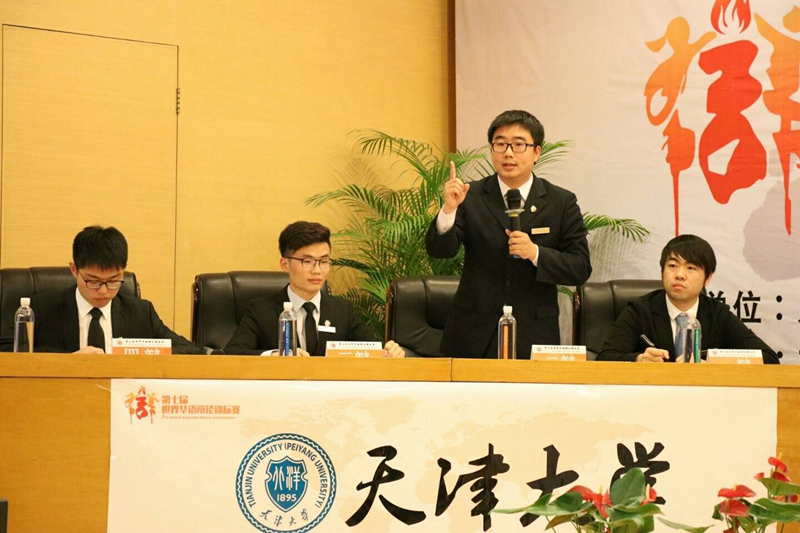
On April 25, 2017, the debating team from Tianjin University (TJU) overcame the University of Melbourne (UM) team, winning the 7th World Mandarin Debate Championship. Tianjin University’s debater Xie Yu won the title of the ‘Best Debater’. In the contest, TJU argued that “contemporary youth should focus more on achieving a big goal than on living their own daily life”, while the UM stood on the opposite side.
More than 400 universities from different regions including the Chinese mainland, Hong Kong, Macao, Taiwan, Europe and America, have participated in the World Mandarin Debate Championship since its first session in 2011. It has become the world's largest and most influential mandarin debating event. This year, 388 universities participated. After the group matches, the knockout rounds, the semi-finals and the finals, TJU and the UM reached the final.
The four debaters from TJU are all students of science and engineering majors. The first speaker of the team, Song Zixu, is a senior from the School of Environmental Science and Engineering; the second speaker Xie Yu, a doctoral candidate, and the third speaker Fu Li are both from the School of Precision Instrument and Opto-electronics Engineering; and the fourth speaker Yu Jianghao is from the School of Architecture.
Follow their “big goal”
To win the game is undoubtedly the "big goal" of every team. TJU’s debating teams are no exception. TJU participated in the third, fifth and sixth World Mandarin Debating Championships in 2013, 2015 and 2016, which in every one TJU failed pitifully in the group stages. However, they never gave up their big goal and finally entered the seventh Championship this year in order to complete what they set out to do. The four debaters made long and hard preparations for the debate. A month before they entered the group matches, they had started discussions on the topics, consulting a number of related books so that they could determine their line of thinking and the system of contents. During the two weeks before the final, on top of intensive discussion, they invited some debating teams from Beijing and Tianjin to help them rehearse so that they could hone and improve their debating skills. What’s more, during the last week before the final, they stayed together to discuss the subject almost all the time except when attending classes. During that period, they stayed up late at night often until two or three o'clock.
Live their every "daily life"
For these debaters, what impressed most is not the great joy after winning each debating game, but the intense preparation for the games. For instance, on the afternoon of April 22, on hearing of their success in the group stage, they immediately devoted themselves to the preparation for the next game, discussing the subject until 4:30 am. After a short two-hour’s break, they quickly refreshed themselves and got ready for the approaching match. With adequate preparation and stable performances, they outstripped the debaters from the China University of Political Science and Law and thus successfully stepped into the top eight teams. However, they didn’t have time to celebrate it, because on that afternoon they would debate against the powerful and excellent team from Nanjing University (NJU). Therefore, the exhausted debaters again engaged in crazy discussion. To their relief, they gained a 3:2 victory over NJU.
Think in a dialectical and comprehensive way
During these games from April 21 to 24, the debaters found that the strongest opponents were NJU in the quarter-final and the East China University of Political Science and Law (ECUPL) in the semi-final. At that time, they had worked for a long time with high intensity. But unwilling to leave any regrets and relying on a large amount of brewing coffee for refreshment, they were fully devoted to each match with the firm belief of going beyond themselves. Talking about their victory in the semi-final, the team leader Yu Jianghao said: “In the semi-final, the debaters from ECUPL were all excellent, and they also had an excellent lawyer as their coach. We finally won a narrow victory by 3:2, maybe because our debating proposition was more approachable and easier to understand. In each debate, we made corresponding adjustments according to the opponent debaters.”
In the semi-final, Xie Yu gave a wonderful performance. When a debater from ECUPL tried to prove his opinion by quoting scientific theories, Xie Xu was smarter to support his argument by employing the logical relations embodied in the theory of relativity, physics, the collapse of the universe, etc., showing his huge accumulation of scientific knowledge and strong logical thinking ability.
By: Wang Qiuju, Wang Kai
Editors: Sun Xiaofang and Ross Colquhoun






